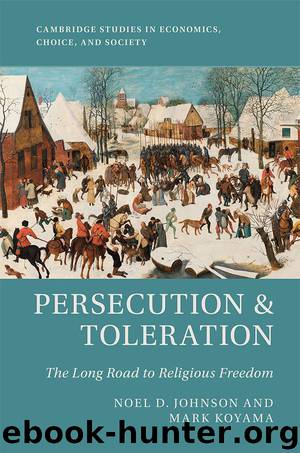Persecution and Toleration (Cambridge Studies in Economics, Choice, and Society) by Noel D. Johnson & Mark Koyama

Author:Noel D. Johnson & Mark Koyama [Johnson, Noel D. & Koyama, Mark]
Language: eng
Format: epub
Publisher: Cambridge University Press
Published: 2019-02-14T00:00:00+00:00
The corporate political character of the medieval European Jewish community ceased to exist. Rabbis were no longer civil magistrates with police powers. Instead, they exercised authority only among those they could persuade to obey.
Ellenson (1994, xii)
The treatment of Jews in medieval and early modern Europe has provided a case study with which to examine the conditional toleration equilibrium under a finer microscope. This has provided an in-depth portrait into how important religion was and how European states governed on the basis of discriminatory and restrictive identity rules. In this chapter we study how at the end of the eighteenth century states across Western Europe began to dismantle these rules.
First, we examine the reasons for the decline in persecutions and violence against Jews. Though expulsions, riots, and pogroms still took place, the number of acts of violence against Jews markedly diminished after 1600. We review evidence that the rise of state capacity that took place during this period played a crucial role in extending protection to Jewish communities.
Second, we study the legislative changes, collectively known as Jewish emancipation, that transformed the status of Jews across Western and Central Europe, bringing them legal equality. Inspired by mercantilistic concerns, rulers in the Habsburg empire and Germany slowly freed Jews from many of the restrictions that governed their existence during the medieval period. The French Revolution and the armies of Napoleon then spread emancipation across Europe. These shocks swept away much of what remained of the conditional toleration equilibrium and set the stage for the emergence of economic and political liberalism in the second half of the nineteenth century.1
Download
This site does not store any files on its server. We only index and link to content provided by other sites. Please contact the content providers to delete copyright contents if any and email us, we'll remove relevant links or contents immediately.
Why Nations Fail by James A. Robinson Daron Acemoglu(1061)
How Change Happens by Duncan Green(902)
Reprogramming The American Dream by Kevin Scott(778)
The Sovereign Individual: Mastering the Transition to the Information Age by James Dale Davidson & William Rees-Mogg(769)
The Bottom Billion by Collier Paul(672)
The Sovereign Individual by James Dale Davidson & Lord William Rees-Mogg(633)
40 Unbreakable Laws of Money by Wayne Wakefield(608)
Globalization and Its Discontents (Norton Paperback) by Stiglitz Joseph E(605)
The Rise and Fall of American Growth: The U.S. Standard of Living since the Civil War (The Princeton Economic History of the Western World) by Robert J. Gordon(567)
The Post-American World by Fareed Zakaria(550)
Reprogramming the American Dream by Kevin Scott & Greg Shaw(528)
Prophetic City: Houston on the Cusp of a Changing America by Stephen L. Klineberg(507)
The Prosperity Paradox by Clayton M. Christensen(505)
Freedom's Laboratory by Audra J. Wolfe(501)
Creative Economy Entrepreneurs by Alice Loy(490)
How Rich Countries Got Rich ... and Why Poor Countries Stay Poor by Erik S. Reinert(485)
India Calling by Anand Giridharadas(483)
Building Community by James S. Gruber(454)
ArcGIS for Environmental and Water Issues by William Bajjali(432)
